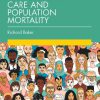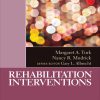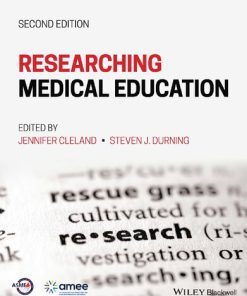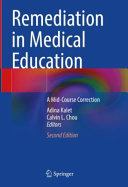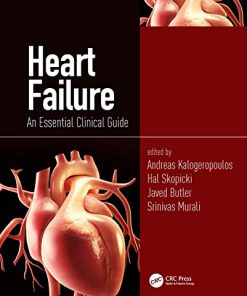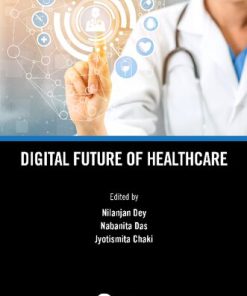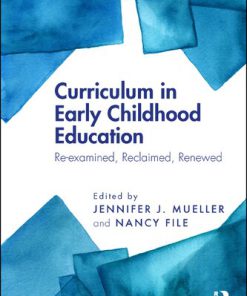Researching Medical Education 2nd Edition By Jennifer Cleland, Steven Durning ISBN 9781119839439 1119839432
$50.00 Original price was: $50.00.$25.00Current price is: $25.00.
Researching Medical Education 2nd Edition By Jennifer Cleland, Steven Durning – Ebook PDF Instant Download/Delivery: 9781119839439 ,1119839432
Full download Researching Medical Education 2nd Edition after payment
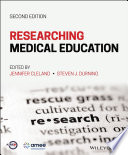
Product details:
ISBN 10: 1119839432
ISBN 13: 9781119839439
Author: Jennifer Cleland, Steven Durning
Researching Medical Education is an authoritative guide to excellence in educational research within the healthcare professions presented by the Association for the Study of Medical Education and AMEE. This text provides readers with key foundational knowledge, while introducing a range of theories and how to use them, illustrating a diversity of methods and their use, and giving guidance on practical researcher development. By linking theory, design, and methods across the spectrum of health professions education research, the text supports the improvement of quality, capacity building, and knowledge generation.
Researching Medical Education includes contributions from experts and emerging researchers from five continents. The text includes information on:
- Developing yourself and your practice as a health professions education researcher
- Methods and methodologies including ethnography/digital ethnography, visual methods, critical discourse analysis, functional and corpus linguistics, critical pedagogy, critical race theory and participatory action research, and educational neuroscience methods
- Theories including those where relationships between context, environment, people and things matter (e.g., complexity theory, activity theory, sociomateriality, social cognitive theories and participatory practice) and those which are more individually focused (e.g., health behaviour theories, emotions in learning, instructional design, cognitive load theory and deliberate practice)
- Includes 10 brand new chapters
Researching Medical Education is the ideal resource for anyone researching health professions education, from medical school to postgraduate training to continuing professional development.
“This is an extraordinary text that combines theory and practice in medical education research. The authors represent the who’s who of medical education research, and their wisdom and insights will help guide novice and experienced researchers alike.”
—David M. Irby, Professor Emeritus of Medicine, University of California, San Francisco, USA
“Research in health professions education is maturing. This is clearly evidenced by the second edition of Researching Medical Education. In 30 chapters this book takes you on an exciting voyage on research theories and research methodologies. This book is a comprehensive resource for anyone engaging in research in health professions education.”
— Cees van der Vleuten, former Director of the School of Health Professions Education, Maastricht University, The Netherlands
Researching Medical Education 2nd Edition Table of contents:
PART I: Developing your practice as a health professions education researcher
1 Exploring, measuring or both: considering the differences between qualitative, quantitative and mixed methods research
Philosophical differences
Comparing research design in quantitative, qualitative and mixed methods research
Data collection methods
Data management
Data analysis
Judging the quality of research
Conclusion
Recommended reading
References
2 Theory in health professions education research: the importance of worldview
The purpose of education research
The importance of worldview to study design
Personal assumptions and worldview
The relationship between theory and research
Conclusion
References
3 Constructivism: learning theories and approaches to research
Distinguishing constructivism from positivism: a review of important terminology
Constructivist theories of learning
Constructivist approaches to research
Five research examples of constructivist research traditions
Methods commonly used within constructivist research approaches
The role of the researcher within the constructivist paradigm
Approaches to ensure quality and rigour of research
Important points and common pitfalls
Conclusion
References
4 Widening access to medicine: using mid‐range theory to extend knowledge and understanding
Increasing diversity in medical schools
There is nothing as practical as a good theory43
Theoretical trends in widening access research
Wave 4: Looking ahead
Conclusion
References
5 Developing the research question: setting the course for your research travels
Why a research question?
The research question under the microscope
The ‘good’ research question
Developing the research question
Refining the research question
Conclusion
Recommended reading
References
6 Researching technology use in health professions education: questions, theories, approaches
What?
Who?
Where, when, how?
Why?
Theorising technology use
Methodologies
Study designs and methods
Conclusion
Recommended reading
References
7 Power analyses: planning, conducting and evaluating education research
Compute and report effect sizes with confidence intervals
Practicalities and pitfalls
Conclusion
References and resources
8 Navigating health professions education research: exploring your researcher identity, research area and community
Why are you doing research?
Why are you doing this research?
Where are you doing research?
Interrelated questions and intentional answers
Recommended reading
References
9 How to tell compelling scientific stories: tips for artful use of the research manuscript and presentation genres
Writing up
Presenting your work
Presenting virtually
Communicating science on social media
Conclusion
Recommended reading
References
PART II: Methodologies and methods for health professions education research
10 What is known already: reviewing evidence in health professions education
Introduction
Evidence‐based and best evidence
‘Systematic review’ vs reviews that are ‘systematic’
The methodological pillars of ‘systematic’ reviews in health professions education
Specific review traditions
Conclusion
References
11 Qualitative research methodologies: embracing methodological borrowing, shifting and importing
Methodological borrowing
Qualitative description
Methodological shifting
Grounded theory
Methodological importing
Discourse analysis
Conclusion
Recommended reading
References
12 Attuning to the social world: ethnography in health professions education research
History and context of ethnography
Focused ethnography
Autoethnography
Going online: digital ethnography
Conclusion
Recommended reading
Acknowledgements
References
13 Visual methods in health professions research: purpose, challenges and opportunities
Using visuals in health professions education research
When to use visual methods and why
What do visual methods look like? Epistemological roots and key features
How to use visual methods
Challenges of using visual methods
Conclusion – and new frontiers
Recommended reading
References
14 Critical discourse analysis: questioning what we believe to be ‘true’
What is a discourse
Why is discourse important?
Discourse analysis
Opening the can of worms
Limitations of and alternatives to foucauldian discourse analysis
A return to the curriculum problem
Conclusion
Recommended reading
References
15 Functional and corpus linguistics in health professions education research: the study of language in use
Functional linguistics in health professions education research: making choices to make meaning
Corpus linguistics in HPE research: a pragmatic, accommodating approach to language in use
Conclusion
Recommended reading
References
16 Challenging epistemological hegemonies: researching inequity and discrimination in health professions education
Moving from numbers to words: a plea for theory–praxis linkage
Equity seeking versus sovereignty seeking groups: indigeneity and decolonising health professions education research
Critical pedagogy – researching praxis towards social justice
Critical reflexivity and inclusive anti‐racist research in health professions education
Transformational methodologies for greater social justice in medical education
Conclusion
References
17 Educational neuroscience: current status and future opportunities
Research methods in educational neuroscience
Educational neuroscience in practice
Conclusion
References
PART III: Theory informing health professions education research
18 Sticking with messy realities: how ‘thinking with complexity’ can inform health professions education research
Part I: Introduction and deliberations
Part II: Application
Part III: Considerations
References
19 Getting active: using activity theory to manage change
Philosophical position
Theoretical concepts
Expansive learning
Case study 1: pandemic‐induced change in primary healthcare activity
Getting practical: change laboratory
Case study 2: OSCEs as activity system
Where AT fits with other theories
Strengths and limitations of AT
Conclusion
Recommended reading
References
20 Attuning to materiality: sociomaterial research in health professions education
Why researching matter matters
Examples of research and synthesis of underpinning principles
Sociomaterial theories
Research approaches
Post‐qualitative research
Sociomaterial ethnography
What is the role of interviews?
Document analysis and interview‐adjacent methods
Analytic methods
The role of the researcher in sociomaterial research
Conclusion
Recommended reading
References
21 Social cognitive theory: thinking and learning in social settings
Theoretical foundations of SCT
Situated cognition, distributed cognition, ecological psychology, situated learning and landscapes of practice: theory and principles
Examples of applying SCT in healthcare professions education
Conclusion
References
22 Learning and participatory practices at work: understanding and appraising learning through workplace experiences
Key conceps, definitions and distinctions
Learning through clinical practice
Investigating participatory practices in healthcare
Advances, cautions and limitations
Conclusion
Recommended reading
References
23 Health behaviour theories: a conceptual lens to explore behaviour change
What health behaviour theories offer to HPE research
The origins of health behaviour theories
How HBT has informed HPE research
Theory of reasoned action (TRA), theory of planned behaviour (TPB), integrated behavioural model (IBM) and reasoned action approach (RAA)
Transtheoretical model (TTM)
PRECEDE‐PROCEED model
Theoretical domains framework
Eclectic approaches
Practical and research implications of using HBTs
Conclusion
Recommended reading
References
24 Self‐regulated learning in health profession education: theoretical perspectives and research methods
Defining self‐regulation and self‐regulated learning
Core assumptions and common features of SRL theories
Related concepts in HPE
Two influential SRL perspectives
Methods for studying SRL in HPE
Future directions in SRL theory, research and practice
Conclusion
References
25 Emotions and learning: cognitive theoretical and methodological approaches to studying the influence of emotions on learning
Defining the terms
Conceptual foundations
Theoretical approaches
Mechanisms of action
Inducing and measuring emotions
Recent explorations of, and future directions for, emotion in medical education
Conclusion
References
26 Research on instructional design in the health professions: from taxonomies of learning to whole‐task models
The ADDIE model
The analysis phase
The design and development phases
The implementation and evaluation phases
Conclusion
References
27 Cognitive load theory: researching and planning teaching to maximise learning
Introduction
Cognitive architecture
Cognitive load: the basics
Cognitive load: recent developments
On the measurement of cognitive load
Cognitive load effects
Conclusion
Acknowledgement
References
28 Deliberate practice and mastery learning: origins of expert medical performance
Powerful medical education
Deliberate practice and mastery learning
Deliberate practice
Mastery learning
Medical education examples
The road ahead
Conclusion
Acknowledgement
References
29 Closing comments: building and sustaining capacity
The initial steps
Building a sustainable research programme
Conclusion
References
30 Conclusion
References
Index
People also search for Researching Medical Education 2nd Edition:
researching medical education 2nd edition
researching medical education book
how to get research in medical school
research and education of medical science
Tags:
Jennifer Cleland,Steven Durning,Researching Medical Education
You may also like…
Education Studies & Teaching - Educational Theory
Education Studies & Teaching - Higher & Further Education
Remediation in Medical Education: A Mid-Course Correction, 2nd Edition Adina Kalet
Medicine - Cardiology
Medicine - Radiology
Medical Imaging Methods: Theory and Applications 1st Edition Edited By Ashutosh Kumar Shukla
Engineering - Civil & Structural Engineering
Digital Future of Healthcare 1st Edition Edited By Nilanjan Dey
Education Studies & Teaching - School Education & Teaching
Education Studies & Teaching - Educational Theory
History - American Studies
The Inuit World Routledge Worlds 1st Edition Edited By Pamela Stern

